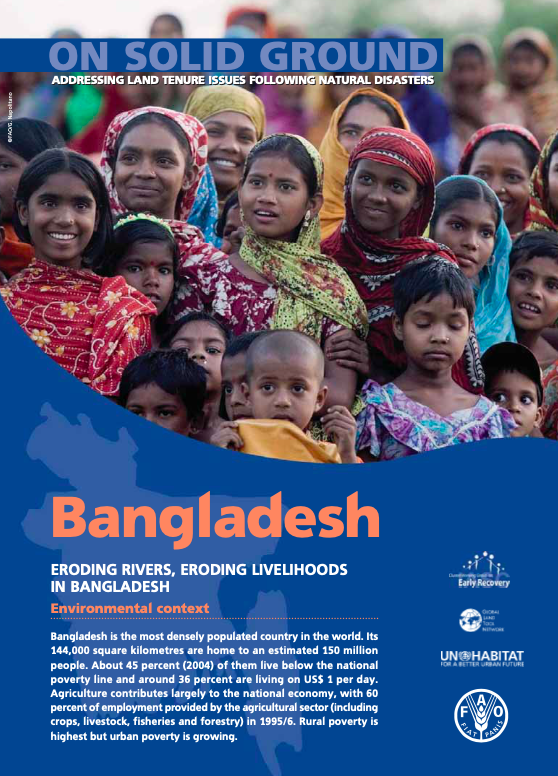Focal point
Location
The Food and Agriculture Organization of the United Nations leads international efforts to defeat hunger. Serving both developed and developing countries, FAO acts as a neutral forum where all nations meet as equals to negotiate agreements and debate policy. FAO is also a source of knowledge and information. We help developing countries and countries in transition modernize and improve agriculture, forestry and fisheries practices and ensure good nutrition for all. Since our founding in 1945, we have focused special attention on developing rural areas, home to 70 percent of the world's poor and hungry people.
Members:
Resources
Displaying 2681 - 2685 of 5074Eroding Rivers, Eroding Livelihoods in Bangladesh
Bangladesh is the most densely populated country in the world. Its 144,000 square kilometres are home to an estimated 150 million people. About 45 percent (2004) of them live below the national poverty line and around 36 percent are living on US$ 1 per day. Agriculture contributes largely to the national economy, with 60 percent of employment provided by the agricultural sector (including crops, livestock, fisheries and forestry) in 1995/6. Rural poverty is highest but urban poverty is growing.
Statutory recognition of customary land rights in Africa
This study examines the statutory recognition of customary land tenure in Botswana, Mozambique and Tanzania, which were chosen as case studies because of the diverse approaches to the issue they represent. Botswana's Tribal Land Act (1968) established a system of regional land boards and transferred the land administration and management powers of customary leaders to the boards, which originally included both customary leaders and state officials among their members.
Bulletin d’information sur les ressources naturelles et l’environnement
Bienvenue dans ce premier numéro du Bulletin d’information sur les ressources naturelles et l’environnement. Il vous apportera chaque mois des informations sur les évènements importants, les nouvelles publications et les projets. Il vous proposera également des entretiens avec des experts sur diverses thématiques comme la bioénergie, le changement climatique, les ressources génétiques et la biodiversité, les ressources en terres et en eau, les régimes fonciers.
Gender and Land Rights
Increasing women’s access to land is crucial to fight hunger and poverty. However, gender disparities in land access remain significant in most countries, regardless of their level of development. A new FAO database helps to understand the factors that prevent women from accessing land; and to design better policies to effectively address this situation.
Nature & Faune, vol. 25, no.1
L’impact de la variabilité et du changement climatiques sur la production agricole et la gestion des ressources naturelles est en cours d’examen approfondi par les scientifiques à tous les niveaux, tant dans les pays en développement que dans les pays développés. Un appel a été lancé pour des innovations technologiques et scientifiques destinées à atténuer les effets du changement climatique en vue de réaliser l’un des objectifs majeurs du Millénaire pour le développement (OMD) d’ici 2015 – éradiquer l’extrême pauvreté et la faim.








